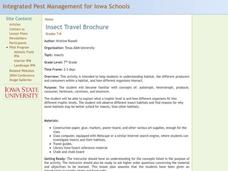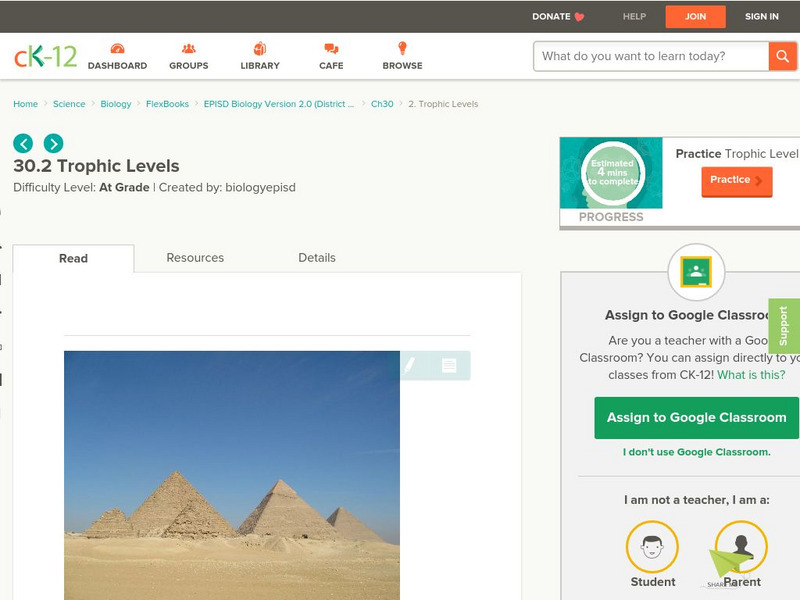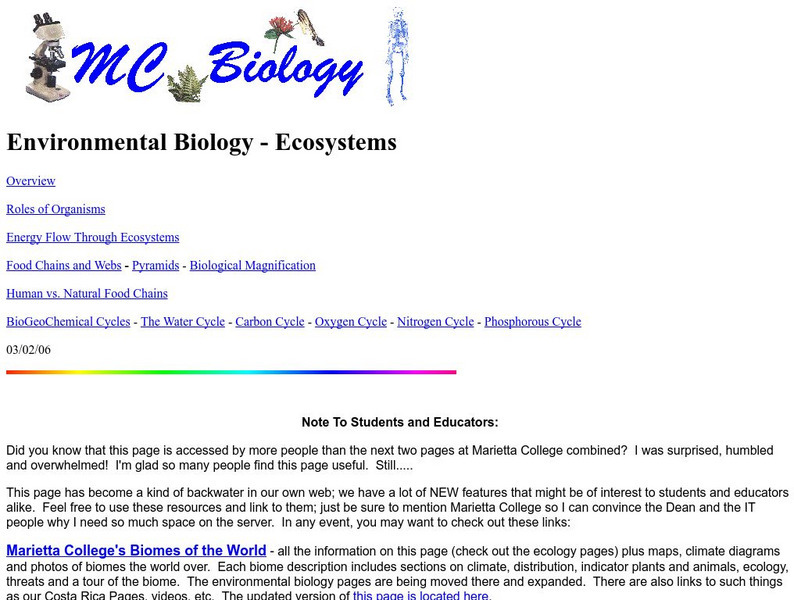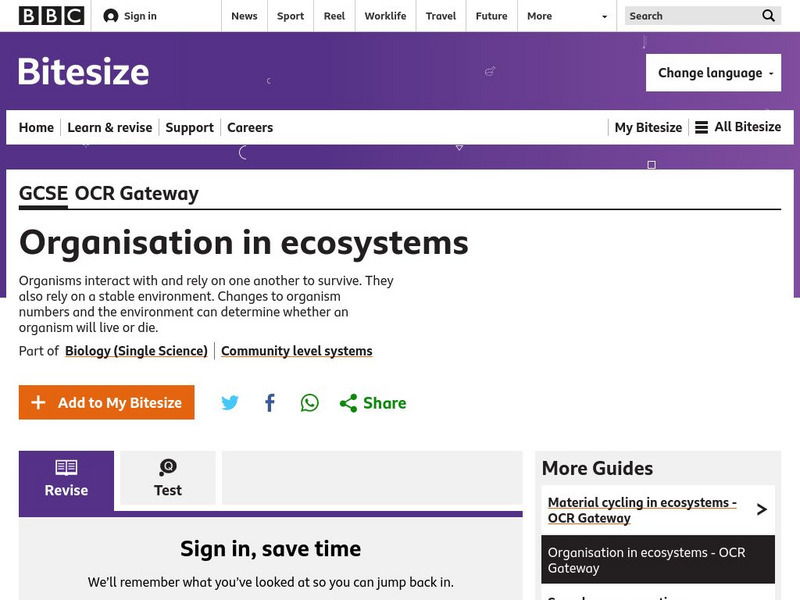Curated OER
Insect Travel Brochure
Seventh graders study producers and consumers in habitats. They examine the trophic levels and how different organisms interact with a focus on insects. They create a travel brochure for an insect to visit a habitat which they create.
Curated OER
2005 Hidden Ocean Expedition What's Eating You?
Analyze data and make inferences about the trophic position of organisms in the Canada marine food web. After a review of the geography and formula, discuss results and write an essay to improve the understanding of Artic food webs.
Curated OER
The Barn Owl Pellet
Seventh graders examine the factors that affect the number and types of organisms that an ecosystem can support. In this ecosystem lesson students study the barn owl and where it is on the food chain, then dissect an owl pellet.
Curated OER
What Should I Know about Biosphere?
If your class is learning about the biosphere, you may find a study guide or reading guide helpful. Focusing on vocabulary, processes, and interactions, the Word document is easy to edit as needed to fit your needs. Another great...
Curated OER
Human Impact Starts with?
What kind of effects do humans have on their environment? Review key anthropogenic vocabulary with a fill-in-the-blank handout. You may wish to use this as an ongoing glossary, review before a test, or even create a crossword puzzle or...
Curated OER
Insect Travel Brochure
Students explore the concept of insects and their habitats. In this insect habitat lesson, students create travel brochures for particular insects. Students must include habitat, producers, and consumers with in the vacation...
Curated OER
Understanding Interactions Among Local Species and the Local Environment
Students examine the differences between biotic and abiotic factors, explain the difference between habitat and niche and compare how organisms get their nutritional needs. In this local environment lesson students trace the path...
Curated OER
Rainforests of Madagascar: Role Playing and Decision Making
High schoolers examine reasons for deforestation and become familiar with Madagascar and its culture, while describing biological and abiotic components of a rainforest, and looking at aspects that must be addressed to resolve the issue...
Curated OER
Just Jelly
Students identify common gelatinous zooplankton in the Canada Basin and their ecological role. They compare and contrast feeding strategies of at least three different types of gelatinous zooplankton.
National Geographic
National Geographic: Marine Food Webs
For this lesson, students learn about marine food webs and pyramids, and how energy flows through a marine ecosystem. They then research a marine organism and its role in a marine food web. The class pools their information to create a...
CK-12 Foundation
Ck 12: Episd: Trophic Levels
[Free Registration/Login may be required to access all resource tools.] Understand what trophic levels are and identify producers and consumers in a food web.
CK-12 Foundation
Ck 12: Biology: Trophic Levels
[Free Registration/Login may be required to access all resource tools.] Describes how to identify trophic levels in a food chain or food web.
Science Struck
Science Struck: Difference Between Food Chain and Food Web
Explains the characteristics of food chains and food web; the different levels of producers, consumers, and decomposers; and the differences between food chains and food webs. Includes charts and a Venn diagram comparing the two.
Texas Education Agency
Texas Gateway: Organism Relationships: Food Chains, Webs, Pyramids
Given illustrations, students will analyze the flow of matter and energy in food chains, food webs, and ecological pyramids.
National Geographic
National Geographic: Marine Ecosystems and Biodiversity
A collection of three lessons where students learn about abiotic factors in marine ecosystems, about marine food chains and biodiversity, and about marine food webs and trophic levels. Includes handouts, website links, and a vocabulary...
OpenStax
Open Stax: Energy Flow Through Ecosystems
Understand how organisms acquire energy and how that energy is passed from one organism to another through food webs and their constituent food chains.
Science Struck
Science Struck: Food Chain in the Tundra Region
Describes the characteristics of a tundra biome, how a tundra food chain compares to a tropical food chain, and what the different trophic levels look like.
National Geographic
National Geographic: Marine Ecosystems and Biodiversity
In this unit young scholars explore major marine ecosystems by locating them on maps. Students use marine examples to learn about energy transfer through food chains and food webs and then they discuss how food webs can illustrate the...
Other
Marietta College: Ecosystems
Complete illustrated discussion of energy flow within ecosystems, including discussions of trophic levels, ecological pyramids, food chains and webs, biological magnification, and cycles.
BBC
Bbc: Gcse Bitesize: Organization in Ecosystems
This lesson focuses on food chains in ecosystems, including levels of consumers, decomposers, and a list of common words used with food chains and their definitions. It also provides a link to an assessment.
Open Curriculum
Open Curriculum: Flow of Energy in Ecosystems
Students will understand and describe food chains and food webs, and explain how energy is transferred between their trophic levels.
CK-12 Foundation
Ck 12: Episd: Energy Pyramids
[Free Registration/Login may be required to access all resource tools.] Understand how energy flows within ecosystems through the use of energy pyramids.
Shmoop University
Shmoop: Ecosystem Energy Flow
Explains the processes by which energy flows through an ecosystem. Covers the meanings of key vocabulary, e.g., types of producers and consumers, trophic levels, food webs, and the energy pyramid.
Bio Topics
Bio Topics: Ecological Pyramids
A colorful tutorial about ecological pyramids. Read the information, and then check your understanding with some questions and answers about the topic.






















